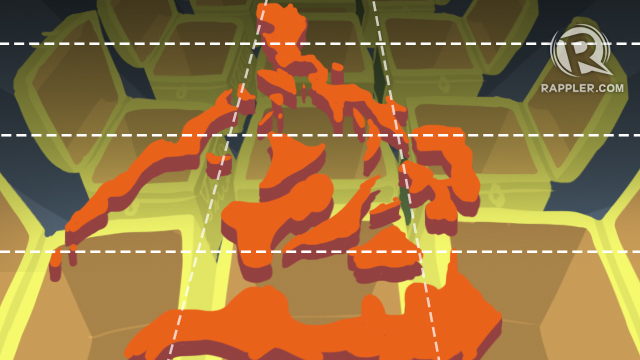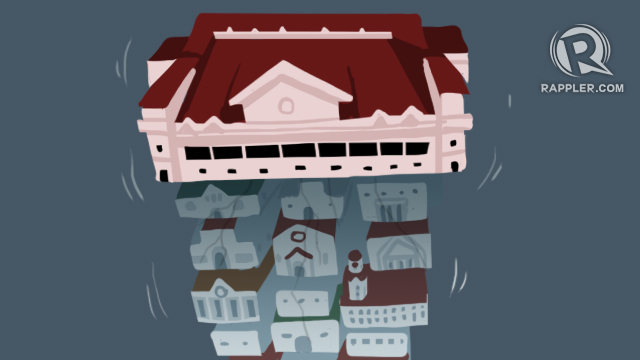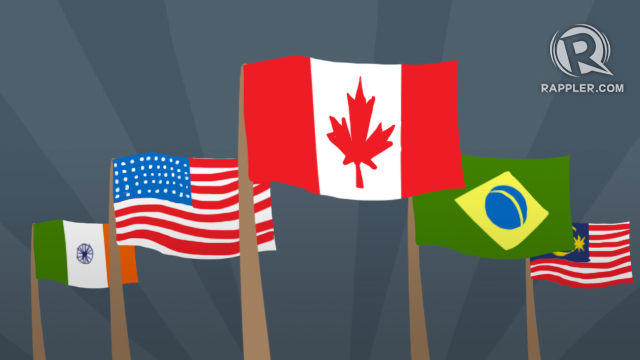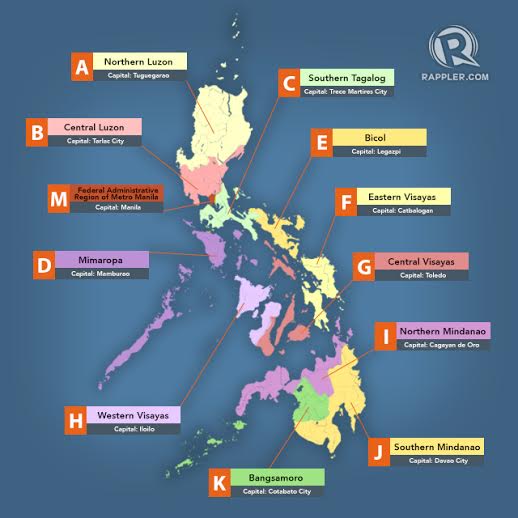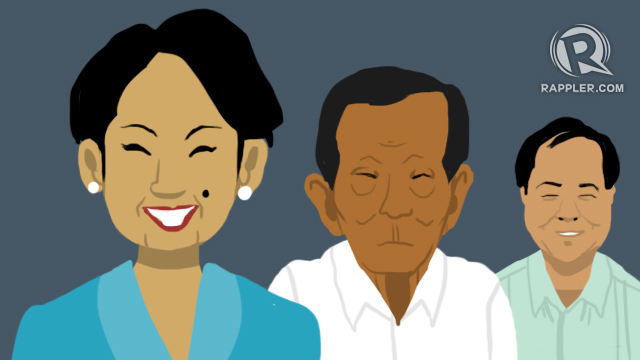A CHANGE IN THE PHILIPPINE SYSTEM OF GOVERNMENT
What is federalism?
It is a form of government where sovereignty is
constitutionally shared between a central governing authority and
constituent political units called states or regions.
In basic terms, it will break the country into autonomous
regions with a national government focused only on interests with
nationwide bearing: foreign policy and defense, for example.
The autonomous regions or states, divided further into
local government units, will have primary responsibility over developing
their industries, public safety, education, healthcare, transportation,
recreation, and culture.
These states will have more power over their
finances, development plans, and laws exclusive to ther jurisdiction.
The central government and states can also share certain powers.
How is it different from what we have now?
We presently have a unitary form of government. Most
administrative powers and resources are with the national government
based in Metro Manila. It's Malacañang that decides how much to give
local government units. The process is prone to abuse, with governors
and mayors sometimes having to beg Malacañang for projects they believe
their communities need.
How local government units spend their budget has to be approved by the national government.
In federalism, the states will have the power to make
these decisions with little or no interference from the national
government.
Examples of federal countries: United States, Canada, Australia, Brazil, India, Malaysia.
PROS
Locals decide for themselves. Regions
have their own unique problems, situations, geographic, cultural,
social and economic contexts. Federalism allows them to create solutions
to their own problems instead of distant Metro Manila deciding for
them.
The states can establish policies that may not be adopted
nationwide. For example, liberal Metro Manila can allow same-sex
marriage which the state of Bangsamoro, predominantly Muslim, would not
allow. In the United States, some states like Colorado and Washington
have legalized recreational marijuana even if other states have not.
This makes sense in an archipelago of over 7,000 islands
and 28 dominant ethnic groups. For decades, the national government has
been struggling to address the concerns of 79 (now 81) provinces despite
challenges posed by geography and cultural differences.
With national government, and thus power, centered in
Metro Manila, it's no surprise that development in the mega city has
spiralled out of control while other parts of the country are neglected.
More power over funds, resources.
Right now, local government units can only collect real estate tax and
business permit fees. In federalism, they can retain more of their
income and are required to turn over only a portion to the state
government they fall under.
Thus, local governments and state governments can channel
their own funds toward their own development instead of the bulk of the
money going to the national government. They can spend the money on
programs and policies they see fit without waiting for the national
government's go signal.
Promotes specialization. The
national and state governments can specialize in different policy
domains. With most administrative powers now with the regional
governments, the national government can focus on foreign policy,
defense, and other nationwide concerns, like healthcare and taxation.
States have more autonomy to focus on economic development
using their core competencies and industries. The state of Central
Luzon can focus on becoming an agricultural hub. The state of Mimaropa,
home to Palawan, can choose to use eco-tourism as its primary launch
pad.
Possible solution to the Mindanao conflict. The
creation of the state of Bangsamoro within a federalist system may
address concerns of separatists who crave more autonomy over the
administration of Muslim Mindanao.
Decongestion of Metro Manila.
Through fiscal autonomy for state governments, federalism will more
evenly distribute the country's wealth. In 2015, 35% of the national
budget went to Metro Manila even if it represents only 14% of the
Philippine population.
Lessens dependence on Metro Manila.
When there is political upheaval in Metro Manila, other regions that
have nothing to do with the chain of events are left waiting for the
resources that ony the national government can release. With federalism,
regions work independently of Metro Manila for most concerns.
Brings government closer to the people.
If detractors say federalism will only make local political dynasties
more powerful, supporters give the argument that, in fact, it will make
all local leaders, including those part of political dynasties, more
accountable to their constituents. State governments will no longer have
any excuse for delays in services or projects that, in the present
situation, are often blamed on choking bureaucracy in Manila.
Assuming more autonomy for regions leads to economic
development, there will be more incentive for Filipinos to live and work
in regions outside Metro Manila. More investors may also decide to put
up their businesses there, creating more jobs and opportunities to
attract more people away from the jam-packed mega city.
Encourages competition. With
states now more self-reliant and in control of their development, they
will judge themselves relative to how their fellow states are
progressing. The competitive spirit will hopefully motivate state
leaders and citizens to level up in terms of quality of life, economic
development, progressive policies, and governance.
CONS
Possibly divisive.
Healthy competition among states can become alienating – creating
rivalries and promoting the regionalism that some say already challenges
the sense of unity in the country. It could enflame hostilities between
ethnic groups in the country like Tagalogs, Cebuanos, Bicolanos,
Ilocanos, Tausugs, and Zamboangueños.
Uneven development among states. Some
states may not be as ready for autonomy as others. Some states may not
be as rich in natural resources or skilled labor as others. States with
good leaders will progress faster while states with ineffective ones
will degrade more than ever because national government will not be
there to balance them out.
But in some federal countries, the national government
doles out funds to help poorer states. A proposed Equalization Fund will
use a portion of tax from rich states to be given to poorer states.
Confusing overlaps in jurisdiction.
Where does the responsibility of state governments end and where does
the responsibility of the national government begin? Unless these are
very clearly stated in the amended Constitution, ambiguities may arise,
leading to conflict and confusion. For instance, in times of disaster,
what is the division of responsibilities between state and national
governments?
May not satisfy separatists in Mindanao.
Separatists are calling for their own country, not just a state that
still belongs to a larger federal Philippines. Federalism may not be
enough for them. After all, the conflict continues despite the creation
of the Autonomous Region in Muslim Mindanao.
How the Philippines would look when federal
In some proposals, there will be 10 or 11 autonomous
states. Senator Aquilino Pimentel Jr envisioned 11 states plus the
Federal Administrative Region of Metro Manila.
Here's how the Philippines will look like as laid out in Pimentel's 2008 Joint Resolution Number 10.
Cost of federalism
Shifting to federalism won't come cheap. It would entail
billions of pesos to set up state governments and the delivery of state
services. States will then have to spend for the elections of their
officials.
Attempts at federalism in PH
There was an attempt during the administration of
President Gloria Macapagal Arroyo. One of her campaign promises was to
reform the 1987 Constitution.
A consultative commission she created recommended
federalism as one of the goals of the proposed charter change. But the
attempt failed because of opposition from various sectors who believed
Arroyo wanted to use the reform to extend her term limit.
(Note that shifting to a federal government does not
necessarily mean an extension of term limits for the sitting president.
Such an extension would only take place in a shift to a parliamentary
government.)
In 2008, Pimentel Jr and Bacolod City Representative
Monico Puentevella filed joint resolutions to convene Congress into a
constituent assembly with the goal of amending the constitution to
establish a federal form of government.






